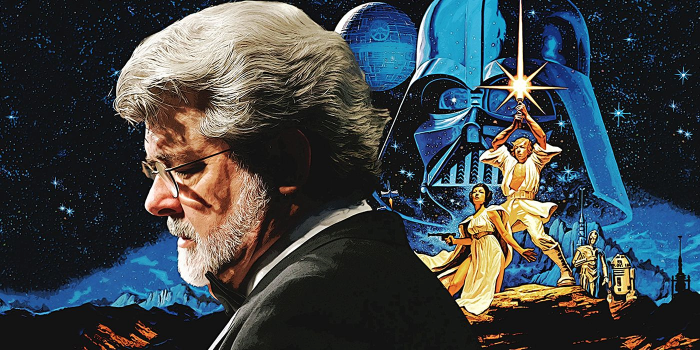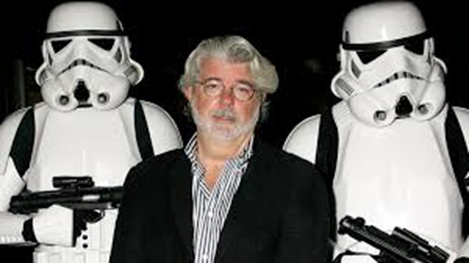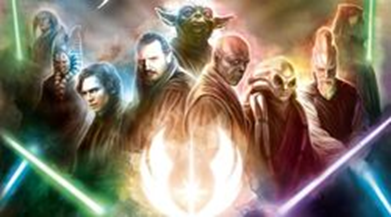When most people hear the name George Lucas, Star Wars is the first thing that comes to mind. However, the man behind one of the most famous space operas of all time, did not originally plan to go into the movie scene. George Walton Lucas junior was born and raised on a ranch in Modesto, California. While going through high school, he became fascinated with drag racing and was determined to become a professional race car driver. Unfortunately, this plan never came to fruition as he was involved in a car accident shortly after his high school graduation that ended his desire to race. Acting on his interest in filmmaking, Lucas attended Modesto Junior College and eventually enrolled in the University of Southern California film school. While enrolled at the college he created Electronic Labyrinth THX 1138 4EB and was awarded first prize in the 1967-68 National Student Film Festival. The Warner Brothers granted him and his scholarship in 1967 to observe the creation of Finian’s Rainbow directed by Francis Ford Coppola. Together Lucas and Coppola created American Zoetrope in 1969 which created a full-length version of THX 1138 in 1971. By the end of 1971 the two split ways and Lucas formed his own film company Lucasfilm Ltd.
During the
1980’s and 90’s, Lucasfilm had a turbulent financial path, and although every
movie introduced major innovations to filmmaking, none approached the fame of Star
Wars. George Lucas took a back row seat during these years, choosing to
write the screenplays for films instead of directing them. Eventually, Lucas
returned to direct in 1998 to produce the Star Wars prequel trilogy.
This trilogy was divisive for both fans and critics but was extremely successful
and fundamental for the continuation of the Star Wars Saga. Lucas
continued his involvement in Star Wars through supervising Star Wars:
The Clone Wars, which fills in the gaps between Episodes II and III of the
prequel trilogy. Eventually, Lucas sold Lucasfilm to Disney in 2012 and stepped
out of the director’s chair. Later, he was consulted on the new Star Wars trilogy
that began with Star Wars: The Force Awakens, although he claims much of
his advice and preferences was ignored. However, the new trilogy eventually
grew on him, and he no longer despises it, although he is not entirely
supportive of the new route Star Wars has taken. Today, he is semi-retired
and is known as the creator of the best space opera of all time.
Following the
creation of Darth Vader from birth to death, the prequel trilogy was far darker
than the original, but it also intertwined history at almost every turn. Throughout
the series, the democracy of the Republic slowly progresses into a dictatorship
under the Sith Lord Palpatine. Lucas was interested in how democratic societies
could fall to dictators and examined this through the willful surrender of
power of the Senate of the Republic. Much of the rise and fall of the Republic
draws from Nazi Germany, as Palpatine mirrors Hitler and the stormtroopers who
defended the Nazi’s in history and Emperor Palpatine in Star Wars. Hitler
was not the only one Lucas drew inspiration for Palpatine from; an American president
also joined the ranks. When asked about Emperor Palpatine’s background, Lucas
stated, “he was a politician. Richard M. Nixon was his name. He subverted the
senate and finally took over and became an imperial guy and he was really evil.
But he pretended to be a really nice guy.”
The Vietnam
War also played a huge role in the inspiration for Star Wars. Just as
the Viet Cong waged a guerilla war against the United States, so too did the
Rebel Alliance wage war against the Galactic Empire. Some of Star Wars cutest
rebels are directly inspired by the Viet Cong as they manage to fend off the
might of the Empire despite primitive weapons and small numbers. Although the Jedi
appear to be superior and just in all matters throughout Star Wars, they
too have a historical basis: the Knights Templar. These knights were a medieval
monastic order known for their devotion and purity. Both groups participate in
individual abstinence from money and worldly pleasures, are headed by a 12-member
council, and wear hooded white robes. Similar to how King Philip IV arrested,
tortured and executed the Knights Templar for heresy in 1307, Palpatine orders the
Great Jedi Purge in Revenge of the Sith, which brings the Jedi Order to its
knees.
In a way, George
Lucas is a collector of sorts and that is reflected throughout Star Wars. Through
the inspirations of Flash Gordon, his love for racing, and many
childhood comic books, the idea for Star Wars was formed. However,
history and its many twists and turns shaped the story of Darth Vader into one
of the greatest villain stories of all time. Journeying through democracy and
dictatorship, family unity and war, love and hate, Star Wars has become
loved by audiences of all ages. From those who grew up watching Luke learn to
be a Jedi to children dressing up as Ewoks for Halloween, Star Wars has made
a place for everyone and demonstrates that the light of the Jedi remains even
in the shadows of an Empire.




I had no idea that Lucas had not originally intended to enter into filmmaking. It is hard to imagine a world without Lucas, considering that he created one of the most universally recognized franchises in cinema history. I am sure he never imagined Star Wars universe would have expanded as much as it has. It is interesting how a series that is set in a fictional universe can incorporate and mirror real history to a point where viewers are able to see the educational connections to the real world. Personally, I was able to recognize some eerily similar historical moments within the franchise but definitely not as many as he drew upon, which is very interesting!
ReplyDeleteVery interesting read! I found it surprising that George Lucas wanted to be a race car driver. I'm glad he was able to turn his unfortunate circumstance of an accident into a filmmaking career. Although I have not watched many of the Star Wars films, I understand the implications behind him selling the rights to Disney. The recent decline of Disney's success in the filmmaking industry solidified the decline of quality within the Star Wars films. Disney wants to maximize profits and is willing to put quantity over quality.
ReplyDeleteThere are so many things that George Lucas takes inspiration from, in addition to what you mentioned he takes a lot from Kurosawa films; especially the film The Hidden Fortess which tells of two peasents helping a princess escape from the enemy. There is some pretty clear inspiration drawn from this and additionally the sword fighting in these movies inspired a lot of the lightsaber combat. I feel that his ability to incorporate aspects of so many genres and ideas is what really makes star wars such a diverse and interesting universe.
ReplyDeleteCollecting on this level is a bit intimidating. Lucas sees connections between history, political theory, and his own experiences that do not immediately seem evident. It is no wonder his work was so novel at the time.
ReplyDeleteGeorge Lucas is just interesting, specifically when considering his creative process. I can't imagine what creating a prequel for such an impactful series must have been like. It is evident that his creative process was extremely successful. I loved how you told his story and the creative process of Star Wars. While I learned a lot from your blog, the most interesting thing to me was the influence of the Vietnam War. I had no idea what its role was in the creation of Star Wars, but considering the time of its creation, it makes a lot of sense.
ReplyDeleteI love the way that history plays so much into the way George Lucas creates. While I have not spent as much time with Star Wars as I would like to, I wonder if the influence of the Vietnam War is something that is visible when watching the first movies released.
ReplyDeleteAnna, this is so interesting! I grew up watching all the Star Wars movies with my dad because they were always his favorite growing up but I had no idea how much they were inspired by historical events. It's so interesting how Lucas wrote and inspired his villains on a psychological level off some of the most infamous and villainous people in history. It is fascinating how he collected pieces of their psyche like Nixon's political insincerity and deceitfulness to weave into his characters.
ReplyDelete